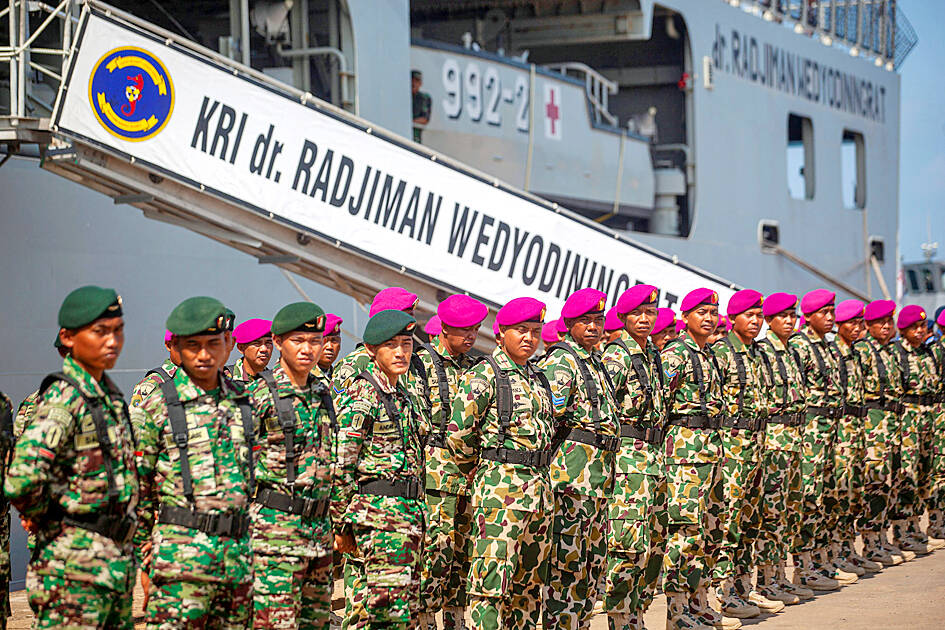ASEAN nations yesterday began their first joint naval exercise at a time when several members are responding more strongly to increasing Chinese assertiveness in the area.
The non-combat drills, named ASEAN Solidarity Exercise, include joint maritime patrol operations, search-and-rescue operations, and humanitarian and disaster relief, Indonesian military chief Admiral Yudo Margono said.
He said the five-day exercise in Indonesia’s Natuna waters aims to boost military ties among ASEAN nations and enhance interoperability. The drills also involve civilian groups involved in humanitarian relief and disaster prevention.

Photo: Antara Foto / Teguh Prihatna / via Reuters
ASEAN nations have taken part in naval exercises before with other countries — including both the US and China — but this week’s drills are the first involving just the bloc and are being read by many as a signal to China.
China’s “nine-dash line,” which it uses to demarcate its claim to most of the South China Sea, has brought it into tense standoffs with rival claimants Taiwan, Vietnam, Malaysia, Brunei and the Philippines, with Chinese fishing boats and military vessels becoming more aggressive in the disputed waters.
The line also overlaps with a section of Indonesia’s exclusive economic zone extending from the Natuna Islands. Margono initially said the exercises would take place in the North Natuna Sea at the edge of the South China Sea, a fault line in the rivalry between the US and China, following meetings of ASEAN defense officials in Bali, Indonesia, in June.
However, Indonesia, which holds the rotating chair of ASEAN this year, decided to move the drills to the South Natuna Islands, away from the disputed area, apparently to avoid any reaction from Beijing.
China and ASEAN signed a nonbinding 2002 accord that called on rival claimant nations to avoid aggressive actions that could spark armed conflicts, including the occupation of barren islets and reefs, but breaches have persisted.
China has come under intense criticism for its militarization of the South China Sea, but says it has the right to build on its territories.
“Those who carry out any exploration or activities in that area must not violate state territory,” Margono said after an opening ceremony for the exercise attended by ASEAN military leaders on Batam island next to Singapore. “That has been clearly regulated by the United Nations Convention on the Law of the Sea.”
Asked whether ASEAN was sending a stronger message against China’s competing territorial claims in the South China Sea, Margono replied: “We have had a firm stance.”
He told reporters that ASEAN has agreed to hold military exercises annually.
In the future, they would be expanded to full war drills involving the army, navy and air force, he said.

The CIA has a message for Chinese government officials worried about their place in Chinese President Xi Jinping’s (習近平) government: Come work with us. The agency released two Mandarin-language videos on social media on Thursday inviting disgruntled officials to contact the CIA. The recruitment videos posted on YouTube and X racked up more than 5 million views combined in their first day. The outreach comes as CIA Director John Ratcliffe has vowed to boost the agency’s use of intelligence from human sources and its focus on China, which has recently targeted US officials with its own espionage operations. The videos are “aimed at

STEADFAST FRIEND: The bills encourage increased Taiwan-US engagement and address China’s distortion of UN Resolution 2758 to isolate Taiwan internationally The Presidential Office yesterday thanked the US House of Representatives for unanimously passing two Taiwan-related bills highlighting its solid support for Taiwan’s democracy and global participation, and for deepening bilateral relations. One of the bills, the Taiwan Assurance Implementation Act, requires the US Department of State to periodically review its guidelines for engagement with Taiwan, and report to the US Congress on the guidelines and plans to lift self-imposed limitations on US-Taiwan engagement. The other bill is the Taiwan International Solidarity Act, which clarifies that UN Resolution 2758 does not address the issue of the representation of Taiwan or its people in

US Indo-Pacific Commander Admiral Samuel Paparo on Friday expressed concern over the rate at which China is diversifying its military exercises, the Financial Times (FT) reported on Saturday. “The rates of change on the depth and breadth of their exercises is the one non-linear effect that I’ve seen in the last year that wakes me up at night or keeps me up at night,” Paparo was quoted by FT as saying while attending the annual Sedona Forum at the McCain Institute in Arizona. Paparo also expressed concern over the speed with which China was expanding its military. While the US

SHIFT: Taiwan’s better-than-expected first-quarter GDP and signs of weakness in the US have driven global capital back to emerging markets, the central bank head said The central bank yesterday blamed market speculation for the steep rise in the local currency, and urged exporters and financial institutions to stay calm and stop panic sell-offs to avoid hurting their own profitability. The nation’s top monetary policymaker said that it would step in, if necessary, to maintain order and stability in the foreign exchange market. The remarks came as the NT dollar yesterday closed up NT$0.919 to NT$30.145 against the US dollar in Taipei trading, after rising as high as NT$29.59 in intraday trading. The local currency has surged 5.85 percent against the greenback over the past two sessions, central